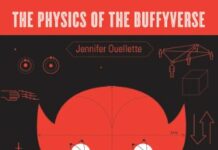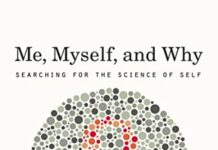
Ebook Info
- Published: 2010
- Number of pages: 336 pages
- Format: PDF
- File Size: 2.66 MB
- Authors: Jennifer Ouellette
Description
Kiss My Math meets A Tour of the Calculus Jennifer Ouellette never took math in college, mostly because she-like most people-assumed that she wouldn’t need it in real life. But then the English-major-turned-award-winning-science-writer had a change of heart and decided to revisit the equations and formulas that had haunted her for years. The Calculus Diaries is the fun and fascinating account of her year spent confronting her math phobia head on. With wit and verve, Ouellette shows how she learned to apply calculus to everything from gas mileage to dieting, from the rides at Disneyland to shooting craps in Vegas-proving that even the mathematically challenged can learn the fundamentals of the universal language.
User’s Reviews
Editorial Reviews: Review “If, like me, you love the neatness of calculus but never appreciated its applications or the colourful characters who have used it through history, then these diaries are well worth a read.” -New Scientist “In The Calculus Diaries, science writer Jennifer Ouellette makes maths palatable using a mix of humour, anecdote and enticing facts…Using everyday examples, such as petrol mileage and fairground rides, Ouellette makes even complex ideas such as calculus and probability appealing.” -Nature “This dash through a daunting discipline bursts with wry wit. Ouellette uses differential equations to model the spread of zombies, and derivatives to craft the perfect diet. Sassy throughout, she reserves special barbs for subprime mortgage holders: “Chances are they weren’t doing the math.” -Discover “The Calculus Diaries is a great primer for anyone who needs to get over their heebie-jeebies about an upcoming calculus class, or for anyone who’s ever wondered how calculus fits into everyday life and wants to be entertained, too!” -Danica McKellar, New York Times bestselling author of Math Doesn’t Suck and Hot X: Algebra Exposed “I haven’t had this much fun learning math since I watched The Count on ‘Sesame Street’ when I was three. And the Count never talked about log flumes or zombies. So The Calculus Diaries wins the day.” -AJ Jacobs, author of The Know-it-All: One Man’s Humble Quest to Become the Smartest Person in the World “Zombies? Surfing? Gambling? Nobody told me calculus could be like this. To my twelfth-grade math teacher: I demand a do-over!” -Carl Zimmer, author of Parasite Rex and The Tangled Bank: An Introduction to Evolution “Back in the day, when I was close to flunking out of calculus class because I couldn’t understand why it was worth my valuable time to actually understand it, I needed someone like Jennifer Ouellette to gently explain how I wrong I was. She’s like every English major’s dream math teacher: funny, smart, infected with communicable enthusiasm, and she can rock a Buffy reference. In this book, she hastens the day when more people are familiar with an integral function than with Justin Bieber.” -Peter Sagal, host, NPR’s “Wait, Wait Don’t Tell Me,” and author of The Book of Vice “In this wonderful and compulsively readable book, Jennifer Ouellette finds the signature of mathematics — and especially calculus, of course — in the most unexpected places, the gorgeously lunatic architecture of Spain’s Antonio Gaudi, the shimmering arc of waves on a beach. Just following her on the journey is the half the fun. But the other half is learning about the natural beauty and elegance of calculations. Ouellette’s ever clear and always stimulating voice is a perfect match to the subject – and The Calculus Diaries is a tour de force.” -Deborah Blum, author of The Poisoner’s Handbook: Murder and the Birth of Forensic Medicine in Jazz Age New York “As amusing as it is enlightening, The Calculus Diaries is no dry survey of abstractions. It’s a guide to everyday life — to car trips and roller- coaster rides, diet and exercise, mortgages and the housing bubble, even social networking. As Ouellette modestly recounts her own learning curve, she and her husband become characters alongside eccentrics such as Newton and Gaudi and William the Conqueror. Like a great dance teacher, Ouellette steers us so gently we think we’re gliding along on our own.” -Michael Sims, author of Adam’s Navel: A Natural and Cultural History of the Human Form “Jennifer Ouellette’s calculus confessional is a delight, and an example of the finest kind of science writing. Her book reveals to its readers the gritty inner workings of the most important idea humans have ever thought. (Yes, calculus is that big: it’s all about understanding how things change in space and time, and there just isn’t much more important than that.) Ouellette’s wit, her elegant wielding of metaphor, and her passion for both math and funky culture produce this crucial insight: every equation tells a story, she says, and she’s right, and the tales she tells here will captivate even the most math-phobic.” -Tom Levenson, author of Newton and the Counterfeiter “Like the movies Batman Begins, Spider-Man, or Superman, The Calculus Diaries is the story of how an insightful, creative, and hard-working young person acquires superpowers and uses them for the benefit of society. Only this tale is true: Jennifer Ouellette can’t fly or spin a web, but she can spin a yarn. The Calculus Diaries documents the author’s seduction by mathematics and her conquering of it–Eureka!–to see the world with sharper vision. For too many people math, calculus in particular, is an albatross. But Ouellette reveals math for what it is, a powerful tool for solving problems and the exquisite language we use to describe nature. Reading this book will make you smarter. And more powerful.” -Eric Roston, author of The Carbon Age “If you ever thought that math was useless, read this book. Want to survive a zombie attack? Win at craps? Beat a zombie at craps? Well, listen to Jennifer Ouellette. The math she describes might just be your best hope if you don’t want your brains to be gobbled by the undead.” -Charles Seife, author of Zero: Biography of a Dangerous Idea “A charming and gentle introduction to important mathematical concepts and their relevance to everyday life.” -Leonard Mlodinow, author of The Drunkard’s Walk: How Randomness Rules Our Lives About the Author Jennifer Ouellette is a science journalist and the author of several books, including The Calculus Diaries, The Physics of the Buffyverse, and Black Bodies and Quantum Cats. Her work has appeared in the Washington Post, Discover, Salon, and Nature, among other publications. She writes a science and culture blog called Cocktail Party Physics on the Scientific American website. Ouellette served from 2008 to 2010 as the director of the Science and Entertainment Exchange, a program of the National Academy of Sciences that aims to foster creative collaborations between scientists and entertainment-industry professionals. She has also been the journalist in residence at the Kavli Institute of Theoretical Physics in Santa Barbara and an instructor at the Santa Fe Science Writing Workshop. Ouellette holds a black belt in jujitsu and lives in Los Angeles with her husband, Caltech physicist Sean Carroll.
Reviews from Amazon users which were colected at the time this book was published on the website:
⭐First, the cons of the book:1) It tries to do too much. The book attempts at once to tell Ouellette’s adventures in learning calculus; which involves anecdotes as a thought experiment she imagined while staying in traffic, going to the casino, and learning how to surf; be funny and easy-going diverging from the subject matter (once to talk about a zombie attack); present calculus putting as few equations as possible, teach you how to do some calculus and show some history behind great mathematicians. Due to that, it becomes unfocused, and doesn’t give its topics as many pages and attention they deserve.2) Pictures, diagrams and equations often can do a fine job at simplifying what could be messy to explain in english, and this book just doesn’t take much advantage of that. In the entire book there are 40 + pictures; but I don’t think it’s nearly enough for a person seeing this math for the first time (I may be wrong, because I was familiar with calculus before buying the book, so I can’t really know), in special because most of them just show the picture of a function’s graph.Pros:1) It is nice to see in a popular math book some mention of female mathematicians. There have been few of them, but some are really noteworthy, yet are forgotten to an extent. For instance, this book discusses the lives and achievements of Sophie Germain and Agnesi.2) The anecdotes of math history were a very good choice on Oullette’s part, they are very interesting.Overall, I like this book, and it’s worth the money. Don’t expect to have many new skills by the time you’re finished, or to be prepared for a course in calculus, but it should inspire you to learn more about math, even if just for distraction. The fact the author herself had a phobia about math and now is so comfortable as to write a book about it is in itself encouraging.Recommendations:If you want to learn more about math history: http://www.amazon.com/gp/product/0395929687/ref=s9_simh_gw_p14_d0_g14_i1?pf_rd_m=ATVPDKIKX0DER&pf_rd_s=center-2&pf_rd_r=0XF6CWSRH8E86GMAMHKV&pf_rd_t=101&pf_rd_p=470938631&pf_rd_i=507846If you want to practice algebra and/or calculus:http://www.amazon.com/Schaums-000-Solved-Problems-Calculus/dp/0071635343/ref=sr_1_25?s=books&ie=UTF8&qid=1326655631&sr=1-25#_ (the pace is very fast, so at points you might need to consult more on the theory, but nothing an internet research won’t make up for, and the exercises simply make for great practice).
⭐My gratitude to Ms. Ouellette. Her book has been on my reading list for over a decade. I recommended it to both of my daughters based on the reviews I had read. Just finished it and immediately regretted that I hadn’t read it sooner. It would have allowed me to be a better educator as well as parent. The normalization of ignorance is a threat to our culture and way of life. Learning how to learn is a lifelong endeavor and, as Jennifer points out, it can never be too late.
⭐On the one hand, the author does a good job of explaining calculus to the layperson, but on the other, she stretches the limits (no pun intended) of where calculus can be used. Certainly calculus explains scientific phenomena, particularly anything dealing with motion, energy, mass, etc. But the author basically assumes that calculus can explain anything that involves the concept of change. Hence, betting and interest. Yes, I know these concepts can be calcula-fied (I do know calculus). But calculus is only remotely applicable to these concepts and has little practical use in dealing with them. The author equates calculus to anything dealing with change, so I suppose we could use calculus to explain Lady Gaga’s series of outfits or who Jennifer Anniston will be dating next and the rate at which these changes will occur.When dealing with pure scientific and mathematical concepts, the author is at her best and not over the head of the lay person. The appendix treatment of the basic concepts of calculus is outstanding. But when she stretches its applicability, she loses some credibility.And all of that zombie nonsense was, I supposed, just inserted for humor. The living dead among us and their fans will no doubt appreciate it. Personally, I would have preferred some Mr. Spock explanations of the mathematics behind the starship Enterprise, if fiction is what she wants to use.And her effort to link calculus to sports through surfing, a sport familiar to very few people in relation to baseball, football, basketball, soccer, hockey, fails unless of course you are into surfing.So there were good things and not so good things. I’m glad I read the book. When it was good, it was very good. When it was bad, it was, well, just a bit of a stretch.
⭐I purchased this book for my soon to be high-schooler son. He is not averse to learning calculus, but questions why he should learn it. Questions I didn’t really know how to answer, so I bought the book (and read it myself before handing to him). While I found the writing style a bit rambling, the book does mention quite a few situations (some real-life and some imaginary) where calculus could be used to find answers, so in that sense it served its purpose for me. I think the descriptions of the solutions could benefit from slightly more rigor though – the solutions are all described verbally, presumably for math-phobic readers. However, I think the reader demographic is more likely people looking for a gentler introduction to calculus than their high-school/college textbooks, and who would find that its more effort to read and digest the verbal descriptions than look at a few equations.
⭐I always wondered what was wrong with me when I took calculus in college, and Jennifer Ouellette describes it perfectly – while I too learned the mechanics and the rules of calculus, I never really understood calculus itself. Basically, I could not relate to what was being taught but I could pass the class by retaining the parts of the whole. Her examples and explanations bring back bits and pieces of those classes long ago, while her background stories and historical footnotes make this book an entertaining read.
⭐Das Buch hab ich mir besorgt, weil ich als Mathematiklehrer hoffte ein paar Beispiele für den Unterricht zu finden. Und daher war ich auch sehr begeistert, dass die ersten Kapitel genau das eingelöst haben: Viele anschauliche Beispiele, die Matematik erklärt soweit notwendig und viele Wissenshappen drumrum – wie z.B. Bill Bryson erzählt Ouellette gerne Anekdoten und geschichtliche Kurriositätend die zum Thema passen.Allerdings nehmen die Anekdoten im Laufe des Buches immer mehr zu, während der mathematische Bezug immer kleiner wird und z.T. aufgesetzt wirkt. Zudem ist die Mathematik z.T. auch einfach zu hoch um kurz mal dargestellt zu werden und wird daher oft praktisch ganz weggelassen. Inbesondere im Kapitel über Wirtschaft ist mir das aufgestossen, bei dem viel über die Immobilienkriese erzählt wird und dann eigentlich nur da steht “und das hat natürlich auch viel mit Analysis zu tun!”, ähnliches gilt für das Kapitel über Diäten, dessen Mathematik mit “Enerigie ist das Integral der Arbeit” zusammengefasst werden kann.Dieses Aufzählen wird aber auf Dauer ermüdend. Und es fehlt zudem der rote Faden, denn die Analysis kommt ja zu kurz. Das ist schade, dass Buch hat sehr gute Ansätze (die ersten beiden Kapitel und das letzte über Wellenfunktionen) aber etwas mehr Mathematik hätte doch sehr gut getan (Zumal der Anhang zeigt wie es geht – Differntialgleichungen anhand einer Zombieapoalypse zu erklären ist schon genial) – Schade!
⭐
⭐Tout d’abord un aveu : il m’est absolument impossible d’être en aucune façon objective en évaluant ce livre. Mon goût pour les sciences en général me fait lire beaucoup de livres de vulgarisation scientifique. Et je suis bon public !La particularité de cet ouvrage est résumée (ou pas) dans son titre. L’auteur arrive à trouver des exemples concrets d’utilisation de l’analyse (étude des fonctions) dans la “vie courante”. Ou du moins, d’utiliser des situations concrètes pour expliquer l’utilisation des principaux outils d’analyse (dérivation et intégration), et un peu de calcul de probabilité, le tout pas trop capillotracté.Ce que j’ai préféré, bien entendu, ce sont les digressions de l’auteur. Sur l’écologie, le surf, mais surtout sur l’histoire des sciences. Quelques biographies rapides de mathématiciens et phyciciens (y compris Sophie Germain, rien que pour ça j’aurais mis au moins 3 étoiles). Des anecdotes amusantes sur le contexte de leurs recherches, les rivalités, etc. Un régal, dommage qu’il n’y en ait pas davantage.Je n’ai relevé qu’une imprécision mathématique. Contrairement à ce que semble dire l’auteur, la dérivée d’une fonction peut s’annuler sans que la fonction admette un maximum ou un minimum (contre-exemple classique : la fonction “cube” admet en zéro une dérivée nulle mais n’y admet pas d’extremum). Au moins deux autres erreurs ont été relevées dans le livre : l’utilisation de « density » au lieu de « mass » et l’utilisation de « proportionality » mal-t-à-propos.Et comme je suis une tantinet maniaque ce n’est pas bien grave : une seule imprécision m’a gênée dans le livre tout entier, j’ai vu pire (une par page dans certains livres!)Dans l’ensemble, un fort bon bouquin, qui se lirait presque comme un roman. Attention pour de courageux lycéens français tout de même, si le vocabulaire est très ressemblant, la notation de la dérivée n’est pas la même que celle utilisée chez nous en cours de maths, donc ça demande un effort d’adaptation.
⭐
⭐数学・科学の英語の本を読むのが好きなのでWEBで検索して本書を購入しましたが最初の微分・積分の発祥の話を除くと数学歴史物語と言った感じで著者が見つけてきた様々なトピックスを微分・積分で語ろうとしています。経歴を見ると「理系」の方でないと分り納得しました。若干強引に微分・積分に結び付けようとする傾向はありますが、ダイエットやギャンブルの話もこういう見かたができるのだと楽しく読むことができました。専門的な知識の取得を目的とするのであれば本書はほとんどあたっていませんが、時間がある時に何か読みたいという対象としては適していると思います。
⭐
Keywords
Free Download The Calculus Diaries: How Math Can Help You Lose Weight, Win in Vegas, and Survive a Zombie Apocalypse in PDF format
The Calculus Diaries: How Math Can Help You Lose Weight, Win in Vegas, and Survive a Zombie Apocalypse PDF Free Download
Download The Calculus Diaries: How Math Can Help You Lose Weight, Win in Vegas, and Survive a Zombie Apocalypse 2010 PDF Free
The Calculus Diaries: How Math Can Help You Lose Weight, Win in Vegas, and Survive a Zombie Apocalypse 2010 PDF Free Download
Download The Calculus Diaries: How Math Can Help You Lose Weight, Win in Vegas, and Survive a Zombie Apocalypse PDF
Free Download Ebook The Calculus Diaries: How Math Can Help You Lose Weight, Win in Vegas, and Survive a Zombie Apocalypse


